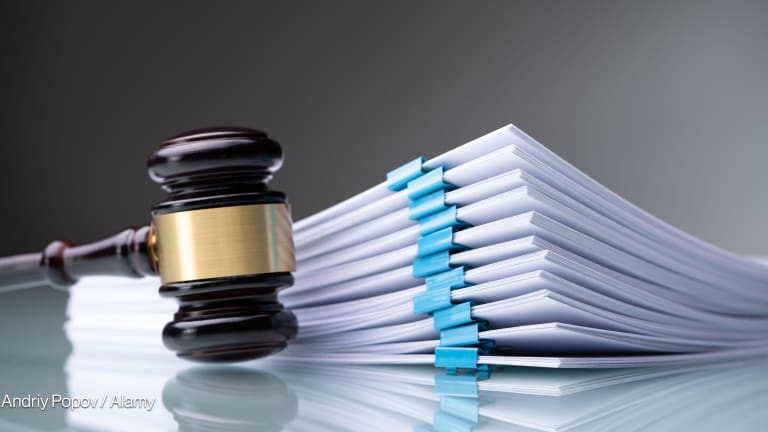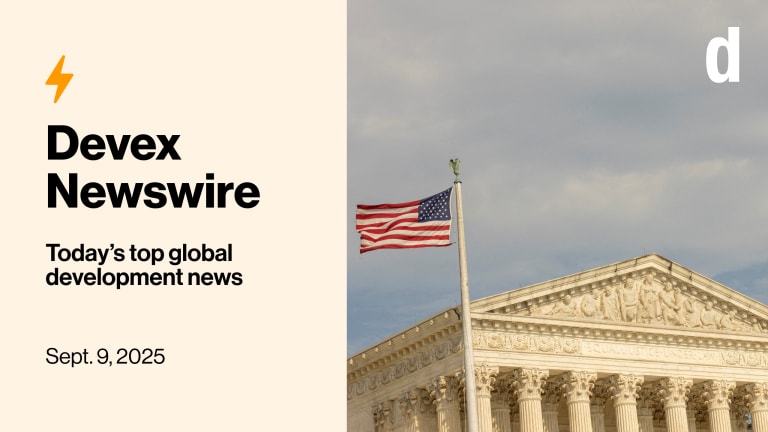Calls for stronger accountability after IFC Supreme Court ruling
In the wake of the landmark ruling by the U.S. Supreme Court that the International Finance Corp. does not have "complete immunity" from legal liability, Devex talks to international lawyers about what being able to sue the World Bank could mean for the institution and communities.
LONDON — The U.S. Supreme Court decision that the World Bank does not have absolute immunity from prosecution is unlikely to trigger a flood of lawsuits but it could bolster calls for the institution to strengthen its internal accountability mechanisms, international lawyers said. On Wednesday, America’s top justices handed down a landmark ruling in favor of a group of Indian villagers looking to sue the International Finance Corp. — the private sector arm of the World Bank — for its support for the coal-fired Tata Mundra Power Plant. The villagers said the project contaminated groundwater, killed marine life, and ejected coal ash into the air. IFC did not contest that the damage occurred, but argued it is immune from liability under U.S. law. “It's a cautiously written decision that opens test or pilot litigation, not necessarily floodgates.” --— Diane Desierto, associate professor of human rights law and global affairs, University of Notre Dame The Supreme Court ruled 7-1 that IFC is “not absolutely immune from suit” since it can be held liable under the 1976 Foreign Sovereign Immunities Act for “commercial activity which has a sufficient nexus to the United States.” However, the immunity issue is still not settled. Questions remain about whether development finance counts as “commercial activity,” and whether the IFC project in India has “sufficient nexus” to America, and these will now be fought out in Washington, D.C., district court. “We don’t yet know the implications of the ruling … there are still unanswered questions and complications,” Marco Simons, a lawyer at EarthRights International, the legal advocacy group which represented the Indian communities, told Devex, before adding that he thinks they have a strong case. Civil society groups heralded the ruling as a “landmark decision” and a “David and Goliath” victory for communities impacted by international institutions. It could open the door to a flood of similar cases against U.S.-headquartered development finance institutions, they said. Fear of a flood of lawsuits was central to IFC’s legal defense, backed by a group of former U.S. Treasury secretaries. IFC needs immunity to fulfill its mandate to “engage in development focused lending to private enterprises,” they said. The increased risk of liability could lead IFC to become more risk averse and discourage companies from seeking its support, they argued. Limited legal implications However, international legal experts said the ruling is unlikely to trigger many lawsuits against IFC, or others, since plaintiffs still face significant financial hurdles in bringing such a suit. “I think the flood of litigation [worry] is a red herring, it’s not practical for the people who are harmed by World Bank projects to bring a suit in the U.S. even if they wanted to,” Vivek Maru, CEO at grassroots legal empowerment NGO Namati, and a former senior counsel at the World Bank, told Devex. The Supreme Court justices also seem skeptical, stating that “restrictive immunity hardly means unlimited exposure to suit for international organizations.” “It's a cautiously written decision that opens test or pilot litigation, not necessarily floodgates,” said Diane Desierto, associate professor of human rights law and global affairs at the University of Notre Dame. But at least one other case against IFC — brought by farmers in Honduras alleging IFC projects are linked to death squads — is now expected to proceed to the U.S. courts as a result of the ruling, according to Simons. Accountability mechanisms still important In practice, while legal action is now an option for communities, the bank’s internal accountability mechanisms — the Inspection Panel and the Compliance Advisor Ombudsman — remain the first port of call for complainants. “It would be in the World Bank Group’s best interest to ensure that these [accountability] mechanisms are fully effective, that management responds appropriately to them.” --— Kindra Mohr, policy director, Accountability Counsel The bank should, therefore, make them more effective in order to avoid complaints escalating to the U.S. courts, according to Kindra Mohr, policy director at Accountability Counsel, a legal advocacy NGO which supports communities impacted by development projects. “While this ruling is a great victory for accountability and opens up litigation options for affected communities, accountability mechanisms are still very important …[and offer] a pragmatic alternative to litigation … They should still be a first resort in most case,” Mohr said. “It would be in the World Bank Group’s best interest to ensure that these mechanisms are fully effective, that management responds appropriately to them, and that the board has a robust oversight function,” she added. However, the ongoing U.S. court case highlights the limitations of CAO, which currently only has advisory powers. The Indian communities’ first recourse was to lodge a complaint with the ombudsman in 2012. CAO staff did an investigation and found IFC had failed to ensure the power plant met environmental and safety standards. Two subsequent monitoring reports from 2015 and 2017, chastised IFC for not doing enough to fix the issues. “The World Bank has all these standards … but they’re not enforceable … IFC’s own ombudsman opinion was so clear … [that IFC] was in gross violation of their own standards but because the ombudsman is just advisory, [IFC] was allowed to ignore those violations,” Maru said. An opportunity for reform? As the bank seeks to do more work in fragile and conflict-affected countries, shareholders, especially the U.S., have been calling for stronger accountability mechanisms to help cope with the additional risks associated with working in these higher-risk environments. Executive directors have already approved changes to the Inspection Panel, which handles complaints related to projects funded through the International Bank for Reconstruction and Development and International Development Association. Attention will now turn to the bank’s private sector work. A board committee met on Friday to discuss IFC’s accountability and grievance response, including CAO. But reforming CAO is only the first step, according to Accountability Counsel’s Mohr. “Strengthening accountability mechanisms is only one part of the accountability framework, and unless there are institutional responses and incentive structures to provide remedy and ensure accountability, communities will remain deprived of justice through these mechanisms,” she said. Namati’s Maru wants the bank to go further and help establish a “new global norm for the private sector,” by setting aside a small amount of total lending for the legal empowerment of communities affected by social and environmental harm, he said. The money would need to be administered by an independent body, he added. “Communities need some legal support to exercise their rights, but there’s such a huge imbalance of power and right now and there’s not a model for financing that legal support but there are cost effective ways of providing it,” he said, before going on to add that: “If the World Bank really wanted to be progressive it could take a lead.” What next for the case The World Bank would not comment on the case as proceedings are ongoing but said in a statement: “We respect the ruling by the U.S. Supreme Court … we are going to work to ensure that this ruling does not affect our ability to deliver for our partner countries and does not hinder our mission.” Asked what IFC’s next steps could be, Simons said the institution may try to change its charter to specify that it has absolute immunity. However, an official familiar with the World Bank’s legal status said this was not currently being explored. “I would be very disappointing if IFC’s response to this is ‘let’s find a way to avoid the suit’ … rather than ‘let’s make sure we are doing a good job.’ That wouldn’t speak well of IFC’s commitment to working with impoverished communities” according to Simons. Instead, he hopes the ruling will “empower” the bank’s shareholders to force the institution to enforce its own standards. “It’s not that complicated, a lot of the harms seen in India were predicted by IFC in the first place,” Simons said. Update, March 4, 2019: This article has been updated to clarify the type of review CAO conducted after the Indian communities’ complaint
LONDON — The U.S. Supreme Court decision that the World Bank does not have absolute immunity from prosecution is unlikely to trigger a flood of lawsuits but it could bolster calls for the institution to strengthen its internal accountability mechanisms, international lawyers said.
On Wednesday, America’s top justices handed down a landmark ruling in favor of a group of Indian villagers looking to sue the International Finance Corp. — the private sector arm of the World Bank — for its support for the coal-fired Tata Mundra Power Plant. The villagers said the project contaminated groundwater, killed marine life, and ejected coal ash into the air. IFC did not contest that the damage occurred, but argued it is immune from liability under U.S. law.
The Supreme Court ruled 7-1 that IFC is “not absolutely immune from suit” since it can be held liable under the 1976 Foreign Sovereign Immunities Act for “commercial activity which has a sufficient nexus to the United States.”
This story is forDevex Promembers
Unlock this story now with a 15-day free trial of Devex Pro.
With a Devex Pro subscription you'll get access to deeper analysis and exclusive insights from our reporters and analysts.
Start my free trialRequest a group subscription Printing articles to share with others is a breach of our terms and conditions and copyright policy. Please use the sharing options on the left side of the article. Devex Pro members may share up to 10 articles per month using the Pro share tool ( ).
Sophie Edwards is a Devex Contributing Reporter covering global education, water and sanitation, and innovative financing, along with other topics. She has previously worked for NGOs, and the World Bank, and spent a number of years as a journalist for a regional newspaper in the U.K. She has a master's degree from the Institute of Development Studies and a bachelor's from Cambridge University.






